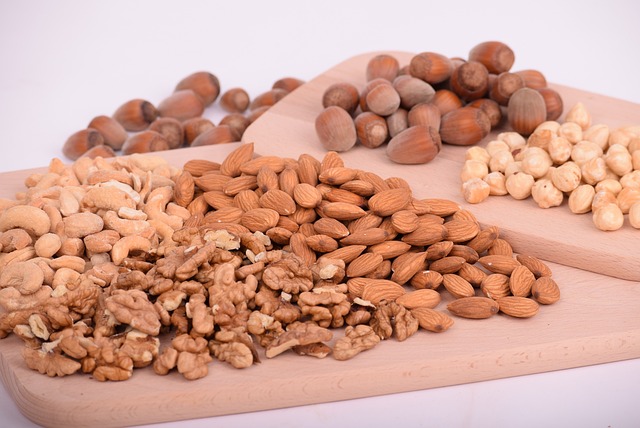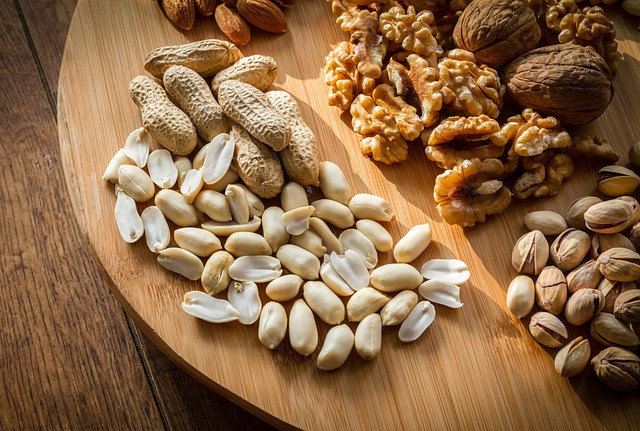Nuts, also known as tree nuts, are the hard-shelled, edible fruits of certain species of trees. Nuts have been around for centuries and have been a staple of many cultures.
They have been praised for their nutritional value, flavor, and versatility. Nuts are incredibly nutritious and have a wide variety of health benefits. In this article, we will discuss the many ways that eating nuts can make you healthier.
Introduction
Nuts are nutrient-rich and contain protein, healthy fats, vitamins, minerals, and antioxidants. They are also low in glycemic index and high in fiber, making them an excellent choice for those looking to control their weight. Additionally, the omega-3 fatty acids found in nuts can help protect your brain health and improve cognitive function.
The vitamins, minerals, and essential nutrients in nuts can also help improve blood sugar levels and reduce inflammation. Eating a variety of different types of nuts can ensure you are getting the maximum nutrition from your diet. Almonds, cashews, walnuts, pecans, pistachios, and macadamia nuts are among the types of nuts that are most commonly consumed.
When consuming nuts, it is important to keep the following practices in mind. Moderation is key, so be sure to eat them in reasonable amounts. Choose unsalted, raw, or dry-roasted nuts whenever possible. If you can find organic, that’s even better. Finally, it’s important to be aware of any allergies you may have.
In conclusion, the health benefits of eating nuts are vast. They are nutrient-rich, can help keep you full and energized, and may reduce your risk of heart disease, cancer, and other chronic illnesses. They also have a low glycemic index, are high in fiber, and contain omega-3 fatty acids, which are essential for brain health. The vitamins, minerals, and essential nutrients in nuts can also help improve blood sugar levels and reduce inflammation. Eating a variety of different types of nuts can ensure you are getting the maximum nutrition from your diet. When consuming nuts, it is important to keep moderation, quality, and allergies in mind.
Nuts are Nutrient-Rich
Nuts are considered to be a nutritional powerhouse, providing numerous health benefits to those who include them regularly in their diets. They are incredibly nutrient-dense, meaning they pack a lot of nutrition into a small package. They are a great source of protein, healthy fats, vitamins, minerals, and antioxidants. All of these nutrients contribute to a wide array of health benefits, from helping you stay full and energized to reducing the risk of chronic diseases like heart disease and cancer.
Protein is an essential macronutrient that is necessary for the growth and repair of tissues in the body. It helps build strong muscles and keep them functioning properly. Nuts are a great source of protein, with some nuts like almonds and pistachios providing as much as 6g of protein per serving.
Healthy fats are another important macronutrient that are essential for proper heart health, brain health, and general wellness. Nuts are an excellent source of healthy fats, including monounsaturated and polyunsaturated fats. These are the “good” fats that can help reduce “bad” cholesterol levels and reduce the risk of heart disease. Walnuts and almonds are particularly rich in healthy fats.
In addition to protein and healthy fats, nuts also provide a variety of vitamins and minerals. Almonds, for example, are an excellent source of vitamin E, a powerful antioxidant that helps protect cells from oxidative stress. Walnuts are rich in B-vitamins, which are important for proper brain and nerve function. Cashews are rich in magnesium, a mineral that helps support blood pressure and bone health.
Nuts are also a great source of antioxidants, substances that help protect the body from free radicals and oxidative damage. Antioxidants can help reduce inflammation and protect cells from damage caused by environmental and lifestyle factors. Almonds, walnuts, and pecans are particularly rich in antioxidants.
Finally, nuts can help keep you full and energized throughout the day. They are high in fiber, which helps slow digestion and can help keep you feeling fuller for longer periods of time. Eating nuts can also help stabilize blood sugar levels and promote weight management.
Nuts and Weight Management
Nuts are a surprisingly beneficial snack option when it comes to weight management. Not only are they low in calories, but they are also high in protein, fiber, and other essential nutrients. This helps to make sure that you are getting the most out of your snacking.
Nuts have a low glycemic index, meaning that, when consumed, they don’t drastically cause your blood sugar levels to spike. This helps you avoid the highs and lows of energy levels, which can often lead to snacking on unhealthy foods.
High in fiber, nuts help you feel fuller for longer periods of time. This helps to reduce cravings and keeps you from overeating. Fiber is also essential for digestion, helping move food through the digestive tract and promoting regular bowel movements.
Another benefit of consuming nuts is that they are high in healthy fats. Eating healthy fat can help to reduce your risk of heart disease, stroke, and other chronic illnesses. Additionally, the healthy fats found in nuts can help to keep you feeling full and energized, reducing the need to snack on sugary, processed foods.
Interestingly, studies have found that adding nuts to your diet can actually help promote weight loss. One study looked at the effects of adding nuts to the diets of obese people and found that those who ate nuts on a daily basis saw a significant decrease in their body mass index (BMI).
Overall, nuts offer a great snack option when it comes to weight management. Not only does their low glycemic index and high fiber content promote weight loss, but eating nuts also helps you achieve the recommended daily intake of healthy fats. So, if you’re looking for a nutritious snack option, consider adding some nuts to your diet.
Nuts and Brain Health
Nuts are an excellent source of nutrients, making them a great addition to any diet. But did you know that they can also have an effect on your brain health? That’s right — research has shown that nut consumption can help improve cognitive function, and reduce the risk of neurodegenerative diseases.
Nuts are a great source of omega-3 fatty acids, which are essential to brain function and health. Omega-3s help to keep the brain nourished and functioning properly. These fatty acids are also linked to improved memory, better concentration, and a lower risk of Alzheimer’s and dementia.
Nuts are also a great source of vitamin E, which is known for its ability to protect brain cells from damage. Studies have shown that people who consume nuts regularly have a lower risk of cognitive decline and other neurological disorders.
In addition to these brain-boosting nutrients, nuts are also high in fiber and protein. Fiber helps you to feel fuller for longer periods of time, which can help reduce cravings and aid in weight management. The protein in nuts helps to keep you energized and can help reduce fatigue and brain fog.
Nuts are also a great source of antioxidants, which help to fight free radicals and reduce oxidative stress. Oxidative stress is a major risk factor for diseases such as Alzheimer’s and Parkinson’s, so consuming nuts can help to reduce that risk.
Finally, nuts are low in sugar and contain healthy fats, which can help to improve brain health. Studies have shown that lower sugar intake can help to reduce inflammation, which is a major factor in cognitive decline. The healthy fats found in nuts, such as monounsaturated fats and polyunsaturated fats, can help to reduce cholesterol levels and improve brain function.
In conclusion, nuts are a great addition to any diet and can have a positive effect on brain health. They’re full of important nutrients, vitamins, minerals, and antioxidants, which can help to reduce inflammation, improve cognitive function, and reduce the risk of neurodegenerative diseases. To get the most out of your nutritional intake, make sure to buy unsalted, raw, or dry-roasted nuts, and choose organic if possible.
Nutritional Benefits
Nuts are an incredibly nutrient-rich food. Not only do they provide essential proteins, healthy fats, vitamins, minerals, and antioxidants, but they can also help keep us full and energized.
Nuts are an excellent source of protein, providing up to six grams of protein per serving. They also contain healthy fats, which are an important part of a balanced diet and can help lower cholesterol levels. Additionally, nuts are full of vitamins, including A, C, E, and K. They are also a great source of minerals like magnesium, calcium, potassium, and iron.
Nuts are also rich in antioxidants, which help protect the body from free radicals and oxidative stress. Antioxidants can help reduce inflammation in the body, and can even reduce the risk of certain types of cancer.
Nuts are also a great choice when it comes to weight management. Nuts have a low glycemic index, meaning that they don’t cause a sudden spike in blood sugar levels, which can lead to weight gain. They are also high in fiber, which helps keep us fuller for longer periods of time. Furthermore, the healthy fats in nuts can help promote weight loss.
Nuts are also beneficial for brain health. They contain omega-3 fatty acids, which are essential for healthy brain functioning. Studies have shown that omega-3s can help improve cognitive function and can even reduce the risk of certain neurodegenerative diseases.
Finally, nuts provide us with a variety of vitamins, minerals, and essential nutrients. Studies have found that consuming nuts can help improve blood sugar levels and can even reduce inflammation.
Nuts are a nutritional powerhouse and can provide us with a variety of health benefits. Whether you’re looking to lose weight, reduce inflammation, or improve brain health, adding nuts to your diet is an excellent choice.
The Benefits of Different Types of Nuts
Nuts are an incredibly versatile food that can be consumed in a variety of ways. Whether you like them raw, roasted, or as a topping for salads and other dishes, nuts are becoming increasingly popular due to their nutritional value and health benefits. There are a variety of different types of nuts that you can choose from, each with its own unique set of benefits. Here is a look at some of the most popular types of nuts and their nutritional benefits:
Almonds are one of the most popular types of nuts. They are high in healthy fats, protein, fiber, and vitamins and minerals. Almonds are also a great source of magnesium, which can help to reduce stress and improve sleep quality. They are also a good source of antioxidants, which can help to protect against premature aging.
Cashews are another popular type of nut. They are rich in healthy unsaturated fats, proteins, and fiber. Cashews are also a good source of copper, magnesium, and phosphorus, which are important for proper metabolism and muscle function. They are also a great source of healthy omega-3 fatty acids, which are essential for brain health.
Walnuts are considered to be one of the healthiest nuts. They are high in healthy omega-3 fatty acids, proteins, and fiber. Walnuts are also rich in antioxidants, which can help to reduce inflammation and protect against premature aging. They are also a great source of vitamin E, which can help to protect your cells against damage.
Pecans are high in healthy fats, proteins, fiber, and vitamins and minerals. They are also a great source of antioxidants, which can help to reduce inflammation and protect against premature aging. Pecans are also high in magnesium, which can help to reduce stress and improve sleep quality.
Pistachios are also a great source of healthy fats, proteins, and fiber. They are a good source of vitamins and minerals, including potassium, which is essential for proper nerve and muscle function. Pistachios are also rich in antioxidants, which can help to reduce inflammation and protect against premature aging.
Macadamia nuts are one of the most nutritious nuts. They are high in healthy fats, proteins, and fiber. They are also a great source of vitamins and minerals, including magnesium, which can help to reduce stress and improve sleep quality. Macadamia nuts are also rich in antioxidants, which can help to reduce inflammation and protect against premature aging.
No matter which type of nut you choose, they all have a wide array of health benefits. Eating a variety of different types of nuts can help to ensure that you are getting the full range of nutritional benefits. Nuts are also a great snack option, as they are high in fiber and protein, which can help to keep you full and energized.
Best Practices and Warnings
When it comes to eating nuts, moderation is key. It’s important to note that while nuts provide many beneficial nutrients, they are also high in calories and fat. Eating too many nuts can lead to weight gain. Therefore, it is recommended that you consume nuts in moderation, no more than a handful (1-2 ounces) per day.
When buying nuts, make sure to buy unsalted, raw, or dry-roasted versions. Nuts that are pre-flavored or salted can be high in sodium, so it’s best to stick with the unsalted versions. If possible, choose organic nuts, as they are grown without the use of pesticides and other chemicals.
If you have any allergies or food sensitivities, make sure you read the label carefully. Also, keep an eye out for any traces of nuts in the ingredients list of the food you buy.
When eating nuts, be mindful of how you store them. Nuts can go rancid quickly, so it’s important to store them in an airtight container at room temperature. If you don’t plan on eating them right away, you can store them in the refrigerator or freezer for a longer shelf life.
In addition, it’s important to note that some nuts may contain higher levels of certain nutrients than others. For example, walnuts are higher in omega-3 fatty acids than other types of nuts. Therefore, it is beneficial to incorporate a variety of nuts into your diet to get all the different nutrients they provide.
Finally, if you are eating nuts as part of a healthy diet, be aware that there are a few things to consider. Eating too many nuts may cause digestive issues, such as bloating or gas. To reduce these symptoms, start by eating a few nuts at a time and slowly increase the amount as your body adjusts.
Overall, eating nuts can be a healthy and nutritious part of your diet. Just make sure to practice moderation and follow the best practices for purchasing, storing, and consuming nuts.


